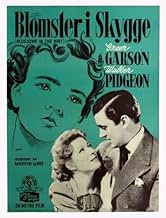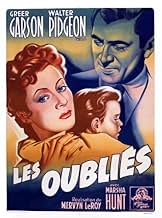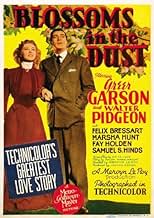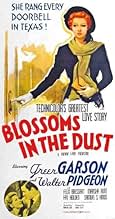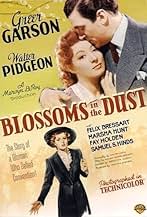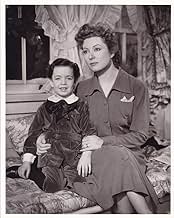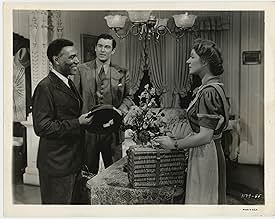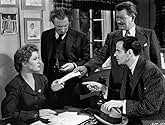AVALIAÇÃO DA IMDb
6,9/10
2,5 mil
SUA AVALIAÇÃO
Adicionar um enredo no seu idiomaAfter losing her young son, Edna Gladney opposes the unfair laws discriminating against children whose parents are unknown, and opens an orphanage for those children.After losing her young son, Edna Gladney opposes the unfair laws discriminating against children whose parents are unknown, and opens an orphanage for those children.After losing her young son, Edna Gladney opposes the unfair laws discriminating against children whose parents are unknown, and opens an orphanage for those children.
- Direção
- Roteiristas
- Artistas
- Ganhou 1 Oscar
- 3 vitórias e 4 indicações no total
Charles Arnt
- G. Harrington Hedger
- (as Charlie Arnt)
Patricia Barker
- Tony
- (as Pat Barker)
Avaliações em destaque
Edna Gladney was a true inspiration, very ahead of her time and a pioneering figure in the adoption and nursery care field, with a great story worth telling. 'Blossoms in the Dust' is very notable for being the first of eight pairings with Greer Garson and Walter Pidgeon, both fine actors with a legendary partnership at the time. Mervyn LeRoy did do his fair share of great films, especially 'Random Harvest', 'Gold Diggers of 1933' and 'Waterloo Bridge'.
'Blossoms in the Dust' is a beautifully made, beautifully acted and intelligently written film. It is not perfect, but it manages to make the subject accessible, inspiring and worth investing in, at the time where biopic-like films could be too dry and conventional. 'Blossoms in the Dust' also does very well in showing how great a woman in her field Gladney was, while still making her a real person/character and not just an icon. While LeRoy and Pidgeon did even better work than this, Garson's role here for me is one of her best.
It is a shame that the early tragedies weren't dwelled upon enough, near glossed over and too come and go. It is good that the film didn't want to be too serious, but the early tragedies in my mind are crucial to how Gladney came to be the way she became and it would have provided even more depth.
Maybe there could have been fewer characters, figuring out who was who with the children was not always easy.
However, 'Blossoms in the Dust' is a gorgeous looking film, espeically the sumptuous interiors and the Technicolor which is the epitome of first rate. The music is stirring and richly orchestrated, without being excessively melodramatic. LeRoy directs with utmost professionalism and class throughout and never lets things get dull or dry. The acting is very good, while the supporting cast are all dependable with Felix Bressart and dignified Marsha Hunt standouts Pidgeon and especially Garson make more memorable impressions. Pidgeon is a charming presence but this is Garson's film, a nuanced and bold performance that never rings false and wholly successful in making Gladney come over as a real person and not a caricature.
The script is intelligent and sincere, that climactic speech is uplifting and makes one want to stand up and cheer but it is also a tear-jerker. The truly inspirational line "there are no illegitimate children. There are only illegitimate parents" is a line for the ages. The story is always engaging and beautifully told, it has such a warm heart and upbeat quality, while also being very moving without being over-sentimental and compassionately respectful to Gladney, her trials and her achievements. It is not an easy subject to make interesting if one has no prior knowledge about Gladney and her pioneering work, but her story is told accessibly and being someone who has had to overcome a lot it inspired me greatly. It warmed my heart and moved me too, especially later on.
Concluding, very, very good and blossoms in its beauty. 8/10.
'Blossoms in the Dust' is a beautifully made, beautifully acted and intelligently written film. It is not perfect, but it manages to make the subject accessible, inspiring and worth investing in, at the time where biopic-like films could be too dry and conventional. 'Blossoms in the Dust' also does very well in showing how great a woman in her field Gladney was, while still making her a real person/character and not just an icon. While LeRoy and Pidgeon did even better work than this, Garson's role here for me is one of her best.
It is a shame that the early tragedies weren't dwelled upon enough, near glossed over and too come and go. It is good that the film didn't want to be too serious, but the early tragedies in my mind are crucial to how Gladney came to be the way she became and it would have provided even more depth.
Maybe there could have been fewer characters, figuring out who was who with the children was not always easy.
However, 'Blossoms in the Dust' is a gorgeous looking film, espeically the sumptuous interiors and the Technicolor which is the epitome of first rate. The music is stirring and richly orchestrated, without being excessively melodramatic. LeRoy directs with utmost professionalism and class throughout and never lets things get dull or dry. The acting is very good, while the supporting cast are all dependable with Felix Bressart and dignified Marsha Hunt standouts Pidgeon and especially Garson make more memorable impressions. Pidgeon is a charming presence but this is Garson's film, a nuanced and bold performance that never rings false and wholly successful in making Gladney come over as a real person and not a caricature.
The script is intelligent and sincere, that climactic speech is uplifting and makes one want to stand up and cheer but it is also a tear-jerker. The truly inspirational line "there are no illegitimate children. There are only illegitimate parents" is a line for the ages. The story is always engaging and beautifully told, it has such a warm heart and upbeat quality, while also being very moving without being over-sentimental and compassionately respectful to Gladney, her trials and her achievements. It is not an easy subject to make interesting if one has no prior knowledge about Gladney and her pioneering work, but her story is told accessibly and being someone who has had to overcome a lot it inspired me greatly. It warmed my heart and moved me too, especially later on.
Concluding, very, very good and blossoms in its beauty. 8/10.
A good film for a Sunday afternoon, or any other time if you're busy on Sunday.
None of the scenes are dragged out, even the death scenes are treated briefly. Nothing is going to get in the way of the narrative, beginning with a woman overcoming bereavement by taking in the unwanted children an orphans of Texas.
The film then goes on the challenge the very language we use when it comes to these children, with Edna Gladney rejecting the words 'orphan' and 'illegitimate'.
'There are no illegitimate children, only illegitimate parents', she boldly announces to the Texan senate.
And so Gladney's local endeavour becomes a political, state-wide one, and though she never falters in her moral drive, her initial loss is evoked once again in the most cherished of her foundlings.
Fast-paced, fade-outs and an all round good story.
None of the scenes are dragged out, even the death scenes are treated briefly. Nothing is going to get in the way of the narrative, beginning with a woman overcoming bereavement by taking in the unwanted children an orphans of Texas.
The film then goes on the challenge the very language we use when it comes to these children, with Edna Gladney rejecting the words 'orphan' and 'illegitimate'.
'There are no illegitimate children, only illegitimate parents', she boldly announces to the Texan senate.
And so Gladney's local endeavour becomes a political, state-wide one, and though she never falters in her moral drive, her initial loss is evoked once again in the most cherished of her foundlings.
Fast-paced, fade-outs and an all round good story.
Review Date 1/15/2018
PLEASE BEWARE OF SOME REVIEWERS THAT ONLY HAVE ONLY ONE REVIEW. WHEN ITS A POSITIVE THERE IS A GOOD CHANCE THEY WERE INVOLVED WITH THE PRODUCTION. NOW I HAVE NO AGENDA! I REVIEW MOVIES & SPECIALS AS A WAY TO KEEP TRACK OF WHAT I HAVE SEEN! I HAVE DISCOVERED MANY GEMS IN MY QUEST TO SEE AS MANY " C H R I S T M A S " MOVIES AS I CAN.
Now Someone keeps reporting my reviews. I guess they are jealous because I do tell the truth. I want to point out that I never make snide remarks about actors weight or real life sexual orientation. If there acting is terrible or limited "I talk about that". If a story is bad "I will mention that" So why am I being "picked on"? IMDB? When one of my reviews gets deleted IMDB will not even tell me what someone found offensive. Well on to this review.
I have never herd of this film it was part of 4 DVD pack of what Warner Brothers Stated as " Four Holiday Classic Films".
Well if it was never in the pack I would never would have watched it. I think Warner Brothers thinks this film qualifies as a "Christmas Movie" because the first scene and last ends on "Christmas". Truth be told both scenes together are no more then about 10% of the screen time. he story is a highly fictionalized telling of the story of Edna Gladney, an early advocate for the rights of illegitimate children in Texas.
Edna Kahly (Greer Garson) and her adopted sister, Charlotte (Marsha Hunt), are to be married. But, when Charlotte's mother-in-law-to-be discovers that Charlotte was a foundling, she declares the wedding must not occur, and Charlotte kills herself from shame. Meanwhile, Edna falls for a brash cashier, Sam Gladney, at the bank, and eventually marries him and moves with him to his home state of Texas.
Sam Gladney has a flour mill in Sherman, Texas, and at first the couple has an idyllic life, though after a difficult delivery Sam is told Edna must have no more children. Several years later, their son dies, and Sam's effort to ease the pain she still endures by trying to get her to adopt a foundling fails. But the little girl's story touches Edna's heart, and she starts a day care center for the children of working women.
The film is good not great but it is highly enjoyable. It is also a study on how this country treated children who came into this world with a single mother. It also shows how adoption was looked down upon. Very sad.
Now what is great about this film is that it does keep you glued. It also shows a young girl becoming a full fledged woman who takes on the government and forces them to look at what labels do to people and how labels follow you from cradle to grave.
Not for everyone. Most people under 40 might get bored. Adults who like to see a story unfold will be in for a treat.
Well worth watching!
PLEASE BEWARE OF SOME REVIEWERS THAT ONLY HAVE ONLY ONE REVIEW. WHEN ITS A POSITIVE THERE IS A GOOD CHANCE THEY WERE INVOLVED WITH THE PRODUCTION. NOW I HAVE NO AGENDA! I REVIEW MOVIES & SPECIALS AS A WAY TO KEEP TRACK OF WHAT I HAVE SEEN! I HAVE DISCOVERED MANY GEMS IN MY QUEST TO SEE AS MANY " C H R I S T M A S " MOVIES AS I CAN.
Now Someone keeps reporting my reviews. I guess they are jealous because I do tell the truth. I want to point out that I never make snide remarks about actors weight or real life sexual orientation. If there acting is terrible or limited "I talk about that". If a story is bad "I will mention that" So why am I being "picked on"? IMDB? When one of my reviews gets deleted IMDB will not even tell me what someone found offensive. Well on to this review.
I have never herd of this film it was part of 4 DVD pack of what Warner Brothers Stated as " Four Holiday Classic Films".
Well if it was never in the pack I would never would have watched it. I think Warner Brothers thinks this film qualifies as a "Christmas Movie" because the first scene and last ends on "Christmas". Truth be told both scenes together are no more then about 10% of the screen time. he story is a highly fictionalized telling of the story of Edna Gladney, an early advocate for the rights of illegitimate children in Texas.
Edna Kahly (Greer Garson) and her adopted sister, Charlotte (Marsha Hunt), are to be married. But, when Charlotte's mother-in-law-to-be discovers that Charlotte was a foundling, she declares the wedding must not occur, and Charlotte kills herself from shame. Meanwhile, Edna falls for a brash cashier, Sam Gladney, at the bank, and eventually marries him and moves with him to his home state of Texas.
Sam Gladney has a flour mill in Sherman, Texas, and at first the couple has an idyllic life, though after a difficult delivery Sam is told Edna must have no more children. Several years later, their son dies, and Sam's effort to ease the pain she still endures by trying to get her to adopt a foundling fails. But the little girl's story touches Edna's heart, and she starts a day care center for the children of working women.
The film is good not great but it is highly enjoyable. It is also a study on how this country treated children who came into this world with a single mother. It also shows how adoption was looked down upon. Very sad.
Now what is great about this film is that it does keep you glued. It also shows a young girl becoming a full fledged woman who takes on the government and forces them to look at what labels do to people and how labels follow you from cradle to grave.
Not for everyone. Most people under 40 might get bored. Adults who like to see a story unfold will be in for a treat.
Well worth watching!
Just wonderful - powerful enough to move anyone. The fact that this is a true story makes it even more remarkable. Greer Garson deserved the nomination for Best Actress - she covers decades in the life of Edna Gladney who varies from romantic girl to society hostess to earth-shaker.
I found this to be a fast-moving, compassionate (supposedly) true-life story of a woman who helped babies get homes to live in while fighting to have the word "illegitimate" stricken from all record books since it was unfairly penalizing the children.
The three lead actors in the film - Greer Garson, Walter Pigeon and Felix Bressart - are all fun to watch. Garson gives a great speech to Congress near the end of the movie. It's also a nice color film, something that wasn't made much in 1941.
Story-wise, the early tragedies are not dwelled on in here. In fact, they come and go quickly and that's nice because it makes this more of an upbeat movie with a positive message. That's the intent, so why dwell on the negatives?
The only negatives, in my opinion were too much usage of the word "darling," to the point where it's annoying, and the last scene is drawn out a bit too much. But, overall, it's a very powerful movie and guaranteed to bring tears to anyone's eyes. It should appeal to most people. I would like to see this put on a DVD.
The three lead actors in the film - Greer Garson, Walter Pigeon and Felix Bressart - are all fun to watch. Garson gives a great speech to Congress near the end of the movie. It's also a nice color film, something that wasn't made much in 1941.
Story-wise, the early tragedies are not dwelled on in here. In fact, they come and go quickly and that's nice because it makes this more of an upbeat movie with a positive message. That's the intent, so why dwell on the negatives?
The only negatives, in my opinion were too much usage of the word "darling," to the point where it's annoying, and the last scene is drawn out a bit too much. But, overall, it's a very powerful movie and guaranteed to bring tears to anyone's eyes. It should appeal to most people. I would like to see this put on a DVD.
Você sabia?
- CuriosidadesThe child who portrayed Tony in the movie was a 4-year-old named Pat Barker. It was only when Pat came to Fort Worth to celebrate the movie's premiere that the world discovered Pat was really Patricia.
- Erros de gravaçãoSam and Edna celebrated their first anniversary in 1907, which means they married in 1906. But early in the film - when both are still single - they danced to "Let Me Call You Sweetheart", which was not published until 1910.
- Cenas durante ou pós-créditosOpening credits prologue: This is the story of a great woman, and of the great work she is doing for humanity. Her name is Edna Gladney, and she lives in Fort Worth, Texas. We dedicate this picture to her. Let us first take you back to a certain household in Wisconsin at the beginning of the century -
- ConexõesFeatured in MGM/UA Home Video Laserdisc Sampler (1990)
- Trilhas sonorasLullaby
(uncredited)
Music and Lyrics by Herbert Stothart and Earl K. Brent
Sung by Nadine Conner and Irene Crane in opening credits
Principais escolhas
Faça login para avaliar e ver a lista de recomendações personalizadas
- How long is Blossoms in the Dust?Fornecido pela Alexa
Detalhes
- Data de lançamento
- País de origem
- Idioma
- Também conhecido como
- De corazón a corazón
- Locações de filme
- Empresas de produção
- Consulte mais créditos da empresa na IMDbPro
- Tempo de duração
- 1 h 39 min(99 min)
- Proporção
- 1.37 : 1
Contribua para esta página
Sugerir uma alteração ou adicionar conteúdo ausente


